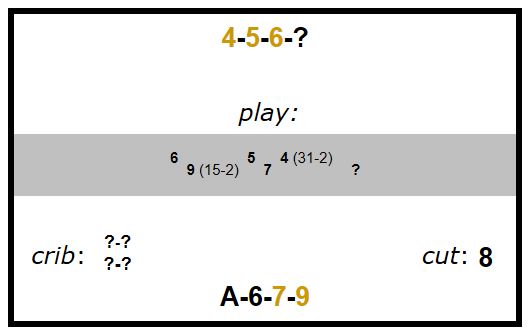Tip 1: Endgame two-on-one, part 1
Tip 2: Pegging psychology
Tip 3: Endgame two-on-one, part 2
Tip 4: Reading your opponent's cards
Tip 5: Flush fakes
Tip 6: Endgame pegging, part 1
Tip 7: Endgame discarding as pone
Tip 8: Endgame two-on-one, part 3
Tip 9: Pairing your opponent's lead
Tip 10: Discarding pointers
Tip 11: Pegging quiz
Tip 12: Endgame pegging, part 2
Tip 13: Endgame discarding quiz
Tip 14: Endgame pegging, part 3
Tip 15: Endgame pegging, part 4
Tip 16: Endgame pegging quiz
Tip 17: Endgame two-on-one, part 4
Tip 18: Discarding quiz
Tip 19: Always play it out
Tip 20: Endgame pegging, part 5
Here's a play you will be able to make once in a blue moon, but if you are not alert when your chance comes, it could cost you a game. Say you are 16 holes away from going out and your opponent is ten away. You are the dealer, you hold A-6-7-9 and an 8 has been cut. Pone leads out with a 6. You play your 9, 15 for two points. He plays a 5, you play a 7, and he plays a 4 for 31...
PONE (111):
Opponent

DEALER (105*):
You
Now you are trying to decided what to lead, your 6 or your A. Like all good cribbage players, you know the advantage of watching your opponent's cards. He has already played a 4, 5 and a 6 so you decide that he is much more likely to have a 6 than an A. Thus you decide to lead the A. But not so fast!!!
If this were any other time in the game, the A would be the better lead. But not here. If your opponent has a 6, he has a 12-hand and enough to put him out (you are not worried that he has a 9 since he would have used it to peg on your 9). But if he happens to have an A, he has only seven points in his hand and he is still eight holes away from winning. By leading your A, you could be giving the game away; leading the 6 will cost you nothing. True, your opponent will seldom be holding the A, so the correct play will seldom pay off, but remember, the correct play can never hurt.
By watching your opponent's cards, you can often obtain valuable information. Just make sure you put that information to its proper use.
- Text copyright © 2002 by Dan Barlow. All rights reserved.